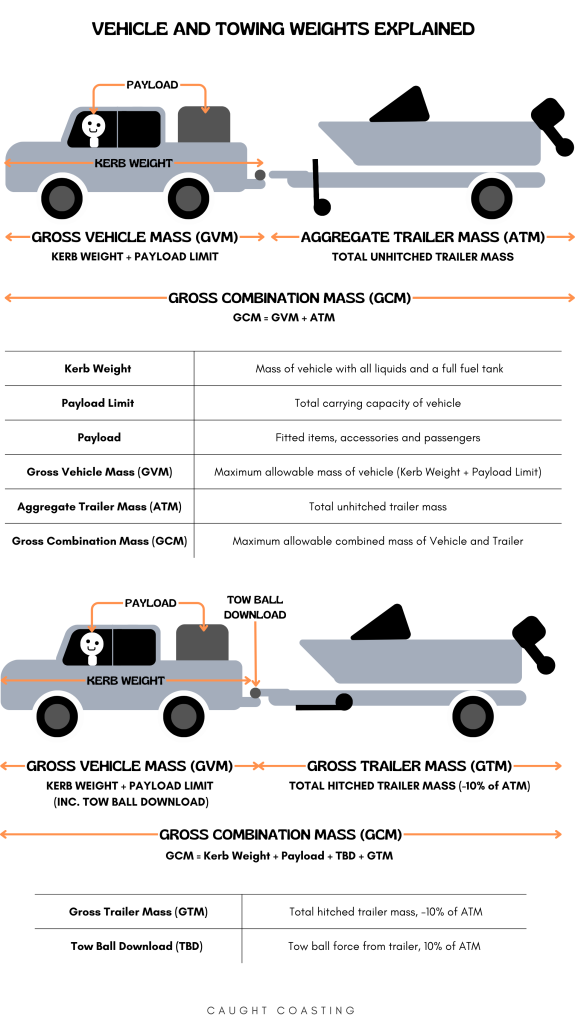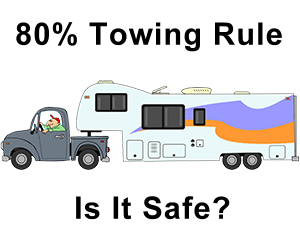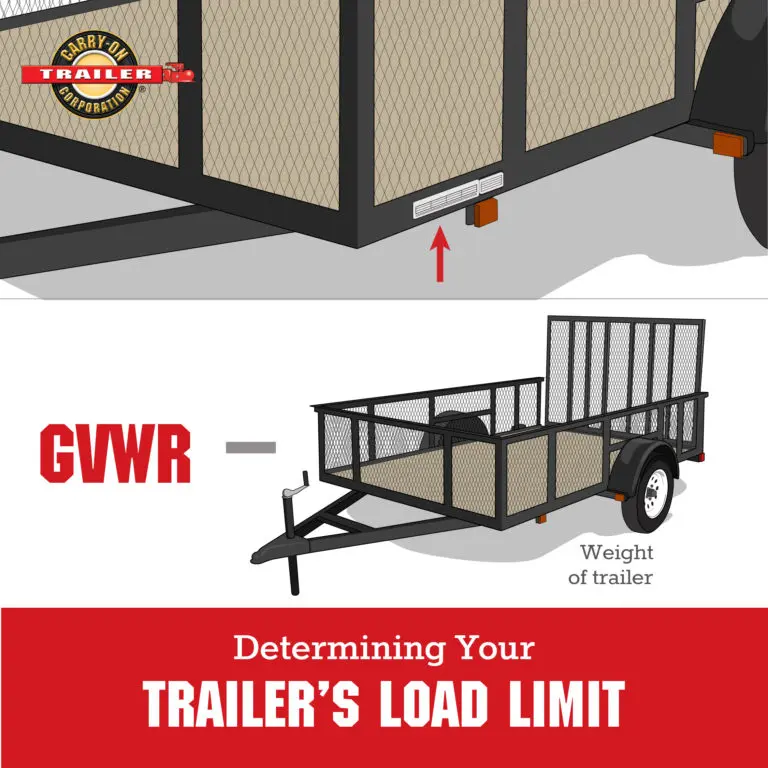Trailer Towing Payload and Capacity Calculator

Determining the correct towing capacity and payload for a trailer is crucial for safe and efficient transportation. Incorrect calculations can lead to accidents, damage to vehicles, and even fatalities. A trailer towing payload and capacity calculator is a valuable tool that helps individuals determine the maximum weight their vehicle can safely tow. By inputting variables such as vehicle weight, trailer weight, and hitch type, users can accurately calculate their towing capacity and ensure a secure towing experience. This calculator is essential for anyone who frequently tows trailers or heavy loads. Accurate calculations are vital for safety.
- Understanding Trailer Towing Payload and Capacity Calculator
- What is the 80% rule when towing?
- How to calculate how much a trailer can hold?
-
Frequently Asked Questions (FAQs)
- What is the Trailer Towing Payload and Capacity Calculator and how does it work?
- What information do I need to provide to use the Trailer Towing Payload and Capacity Calculator?
- How can I use the Trailer Towing Payload and Capacity Calculator to ensure safe towing practices?
- Can I rely solely on the Trailer Towing Payload and Capacity Calculator for towing guidance, or are there other factors I should consider?
Understanding Trailer Towing Payload and Capacity Calculator
The Trailer Towing Payload and Capacity Calculator is a tool designed to help individuals determine the maximum weight their vehicle can safely tow. This calculator takes into account various factors, including the vehicle's gross vehicle weight rating (GVWR), gross trailer weight rating (GTW), and payload capacity. By using this calculator, individuals can ensure they are not exceeding their vehicle's towing capacity, which can help prevent accidents and damage to the vehicle.
What is Gross Vehicle Weight Rating (GVWR)?
The Gross Vehicle Weight Rating (GVWR) is the maximum weight a vehicle is designed to carry, including the weight of the vehicle itself, passengers, cargo, and trailer tongue weight. Exceeding the GVWR can lead to reduced braking performance, increased stopping distance, and reduced vehicle stability. It is essential to consult the vehicle's manufacturer specifications to determine the GVWR.
What is Gross Trailer Weight Rating (GTW)?
The Gross Trailer Weight Rating (GTW) is the maximum weight a trailer is designed to carry, including the weight of the trailer itself, cargo, and any additional equipment. Exceeding the GTW can lead to trailer instability, reduced braking performance, and increased risk of accidents. It is crucial to consult the trailer's manufacturer specifications to determine the GTW.
What is Payload Capacity?
The payload capacity is the maximum weight a vehicle can carry, including passengers, cargo, and trailer tongue weight. This capacity is calculated by subtracting the vehicle's curb weight from its GVWR. Exceeding the payload capacity can lead to reduced vehicle performance, increased wear and tear, and reduced safety.
How to Use the Trailer Towing Payload and Capacity Calculator
To use the Trailer Towing Payload and Capacity Calculator, individuals need to input the following information:
| Vehicle Information | Trailer Information |
|---|---|
| GVWR | GTW |
| Curb weight | Trailer tongue weight |
| Number of passengers | Cargo weight |
By inputting this information, the calculator can provide an estimate of the maximum weight the vehicle can safely tow.
Importance of Accurate Calculations
Accurate calculations are crucial when using the Trailer Towing Payload and Capacity Calculator. Inaccurate calculations can lead to overloading, which can result in reduced safety, increased risk of accidents, and damage to the vehicle. It is essential to ensure that all information is accurate and up-to-date to obtain reliable estimates. Regular maintenance and schedule inspections can also help ensure that the vehicle and trailer are in good working condition, reducing the risk of accidents and damage.
What is the 80% rule when towing?

The 80% rule when towing refers to the maximum weight of the trailer that should not exceed 80% of the vehicle's towing capacity. This rule is in place to ensure safe towing practices and prevent accidents caused by overloading. The 80% rule takes into account the gross trailer weight (GTW), which includes the weight of the trailer, its cargo, and any additional accessories. By following this rule, drivers can reduce the risk of loss of control, brake failure, and other hazards associated with towing.
Understanding Towing Capacity
The towing capacity of a vehicle is determined by its manufacturer and is typically listed in the owner's manual. It's essential to understand that the towing capacity is not just a simple weight limit, but also takes into account the vehicle's engine power, transmission, and axle ratio. When calculating the towing capacity, drivers should consider the following factors:
- The gross vehicle weight rating (GVWR) of the vehicle
- The gross axle weight rating (GAWR) of the vehicle's axles
- The weight distribution of the trailer and its cargo
Calculating the 80% Rule
To calculate the 80% rule, drivers need to determine the maximum allowable weight of the trailer. This can be done by multiplying the vehicle's towing capacity by 0.8. For example, if the vehicle's towing capacity is 10,000 pounds, the maximum allowable weight of the trailer would be 8,000 pounds (10,000 x 0.8). Additionally, drivers should consider the following factors:
- The trailer's dry weight and its cargo capacity
- The weight of any additional accessories, such as hitches and tow bars
- The weight distribution of the trailer and its cargo
Importance of Proper Weight Distribution
Proper weight distribution is critical when towing to ensure stable and safe towing practices. The weight distribution of the trailer and its cargo should be evenly distributed to prevent swaying or loss of control. Drivers can achieve proper weight distribution by:
- Distributing the cargo evenly throughout the trailer
- Using weight distribution hitches to redistribute the weight
- Adjusting the trailer's axle to achieve proper weight distribution
Risks of Exceeding the 80% Rule
Exceeding the 80% rule can lead to serious safety risks, including loss of control, brake failure, and accidents. When the trailer's weight exceeds 80% of the vehicle's towing capacity, it can put excessive stress on the vehicle's engine, transmission, and axles. This can result in:
- Premature wear and tear on the vehicle's components
- Reduced fuel efficiency and increased emissions
- Increased risk of accidents and injuries
Best Practices for Safe Towing
To ensure safe towing practices, drivers should follow best practices, including:
- Regularly inspecting the vehicle and trailer for any damage or wear
- Properly maintaining the vehicle's towing equipment and hitches
- Following the manufacturer's guidelines for towing and weight distribution
How to calculate how much a trailer can hold?

To calculate how much a trailer can hold, you need to consider several factors, including the trailer's size, weight capacity, and distribution of weight. The first step is to determine the trailer's gross trailer weight rating (GTW), which is the maximum weight the trailer is designed to carry, including the weight of the trailer itself, cargo, and any additional accessories. Next, you need to calculate the payload capacity, which is the maximum weight of cargo the trailer can carry, by subtracting the trailer's tare weight (the weight of the trailer when it's empty) from the GTW.
Understanding Trailer Capacity Ratings
To calculate how much a trailer can hold, you need to understand the different capacity ratings provided by the manufacturer. These ratings include the GTW, gross axle weight rating (GAWR), and tongue weight rating. The GTW is the maximum weight the trailer can carry, while the GAWR is the maximum weight each axle can support. The tongue weight rating is the maximum weight that can be applied to the trailer's hitch. Here are some key points to consider:
- Check the manufacturer's ratings for the trailer's GTW, GAWR, and tongue weight rating.
- Understand the axle configuration and how it affects the trailer's weight capacity.
- Consider the weight distribution of the cargo and how it will affect the trailer's stability.
Calculating Payload Capacity
The payload capacity is an important factor in determining how much a trailer can hold. To calculate the payload capacity, you need to subtract the trailer's tare weight from the GTW. The tare weight includes the weight of the trailer itself, as well as any additional accessories, such as brakes and wheels. Here are some steps to follow:
- Determine the trailer's GTW and tare weight.
- Subtract the tare weight from the GTW to get the payload capacity.
- Consider the weight of any additional cargo, such as tools or equipment.
Considering Weight Distribution
The weight distribution of the cargo is crucial in determining how much a trailer can hold. A trailer with a poor weight distribution can be unstable and even tip over. To ensure a stable trailer, you need to distribute the weight evenly and avoid overloading the trailer. Here are some tips:
- Distribute the weight of the cargo evenly throughout the trailer.
- Avoid overloading the trailer, as this can cause it to become unstable.
- Use tie-downs and straps to secure the cargo and prevent it from shifting during transport.
Using Trailer Capacity Calculators
There are several trailer capacity calculators available online that can help you determine how much a trailer can hold. These calculators take into account the trailer's size, weight capacity, and distribution of weight. Here are some steps to follow:
- Enter the trailer's dimensions and weight capacity into the calculator.
- Enter the weight and dimensions of the cargo.
- Use the calculator to determine the maximum payload capacity and recommended cargo weight.
Importance of Regular Trailer Maintenance
Regular trailer maintenance is essential in ensuring the trailer can safely carry its maximum payload capacity. A well-maintained trailer will have properly functioning brakes, good tire condition, and a stable hitch. Here are some key points to consider:
- Regularly inspect the trailer's brakes and tires to ensure they are in good condition.
- Check the hitch and coupling to ensure they are securely attached to the towing vehicle.
- Perform regular maintenance tasks, such as lubricating the axles and checking the electrical system.
Frequently Asked Questions (FAQs)
What is the Trailer Towing Payload and Capacity Calculator and how does it work?
The Trailer Towing Payload and Capacity Calculator is an online tool designed to help individuals determine the maximum weight capacity of their vehicle and trailer combination. This calculator takes into account various factors such as the vehicle's gross vehicle weight rating (GVWR), gross axle weight rating (GAWR), and towing capacity, as well as the trailer's weight and size. By inputting these values, the calculator can provide an accurate estimate of the payload capacity, which is the maximum weight that can be safely carried by the vehicle and trailer. The calculator uses complex algorithms and mathematical formulas to calculate the payload capacity, ensuring that users can tow their trailers safely and efficiently.
What information do I need to provide to use the Trailer Towing Payload and Capacity Calculator?
To use the Trailer Towing Payload and Capacity Calculator, you will need to provide several pieces of information about your vehicle and trailer. This includes the vehicle's make, model, and year, as well as its GVWR and GAWR. You will also need to know the trailer's weight, length, and width, as well as the type of trailer you are using (e.g. enclosed, open, or fifth wheel). Additionally, you may need to provide information about the towing equipment you are using, such as the hitch and ball mount. By providing this information, the calculator can provide an accurate estimate of your vehicle and trailer's payload capacity and towing capacity, ensuring that you can tow safely and efficiently.
How can I use the Trailer Towing Payload and Capacity Calculator to ensure safe towing practices?
The Trailer Towing Payload and Capacity Calculator is a valuable tool for ensuring safe towing practices. By using the calculator to determine your vehicle and trailer's payload capacity and towing capacity, you can avoid overloading, which can lead to towing accidents and equipment damage. The calculator can also help you to identify potential towing hazards, such as inadequate braking or insufficient suspension, and provide guidance on how to mitigate these risks. Additionally, the calculator can help you to choose the right towing equipment for your vehicle and trailer, such as the correct hitch and ball mount, and provide guidance on how to properly install and maintain this equipment. By following the calculator's recommendations and guidelines, you can ensure that you are towing safely and efficiently, and reduce the risk of towing-related accidents.
Can I rely solely on the Trailer Towing Payload and Capacity Calculator for towing guidance, or are there other factors I should consider?
While the Trailer Towing Payload and Capacity Calculator is a valuable tool for determining your vehicle and trailer's payload capacity and towing capacity, it should not be relied upon solely for towing guidance. There are several other factors that you should consider when towing a trailer, including road conditions, weather, and traffic patterns. You should also consider the condition and maintenance of your vehicle and trailer, as well as the type of cargo you are carrying and how it is secured. Additionally, you should always follow safe towing practices, such as checking your mirrors and blind spots regularly, and maintaining a safe following distance. By considering these factors and using the calculator in conjunction with your own knowledge and experience, you can ensure that you are towing safely and efficiently, and reduce the risk of towing-related accidents. It is also important to consult your vehicle's owner's manual and the manufacturer's towing guidelines for specific recommendations and guidelines.
Deja una respuesta

Entradas Relacionadas